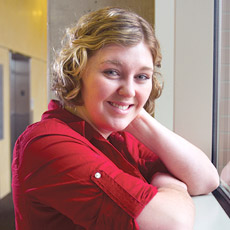She's on a Mission to End Disease

Last summer, sophomore Mariel Rieland joined a SPRINT team to Malawi to work with orphans and to provide community health awareness and preventive care. At the end of almost four weeks in the African heat, instead of escaping home to Billings, Montana, she made her way to Washington, D.C., for the 2012 International AIDS Conference. She learned volumes from Laura Bush, Bill and Hillary Clinton, and "the guy who discovered Ebola."
"Sometimes I take on too much burden for the troubles of the world," says Rieland. "I can't fix everything; that's God's territory. But I can do what I can do."
She hopes that her self-designed major, a bachelor's degree in global health, will place her in direct contact with suffering people. She would like to one day study abroad in Uganda. Rieland has a lot of love and energy to give, and SPU courses such as cultural anthropology and medical sociology are her gateway to understanding what programs work, how human behavior affects illness, and the myths, stigmas, and ostracizing that spring up around medical ignorance.
"Microloans for the poor can be great, but if you're really sick, they may be meaningless," says Rieland, a member of the SPU Speech and Debate Team who seizes every opportunity to better understand the lives and health challenges of the underserved. She sometimes tears up when discussing global poverty with Associate Professor of Sociology Jennifer McKinney. "Not everyone has an equal chance to succeed in the world," Rieland says. "I'm here in America for a reason. Jesus came to declare freedom to the captives. I want to put myself in the shoes of others."
Volunteering is in her DNA. A clothing drive for homeless teens. A thank-you video for the University's donors. Membership in Advancement Core, a team of philanthropic students who give back to the University. Helping at donor dinner functions (where she met the president of World Vision). "Students don't often thank SPU," says Rieland. "We should."
Without her Rosser-Danielson Speech Scholarship, Rieland doubts she could have attended Seattle Pacific and be in the position she is in with her self-designed major. That scholarship, and others she receives, will be even more important for the family should her brother choose to attend SPU.
Scholarships open doors for deserving students — like Rieland — who otherwise could not attend Seattle Pacific. A growing number of scholarship donors are parents of current students who have seen first-hand what it means to benefit from the SPU experience. Gifts of all sizes make a difference, and for those who are able, the President's Circle level of giving offers special programs and benefits.
"SPU wants us to succeed," says Rieland, whose father is a clinical specialist working with heart monitor defibrillators. "The opportunities here can't be quantified. My professors know who I am and really care. I forget that's not the norm out there."


